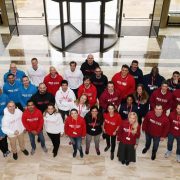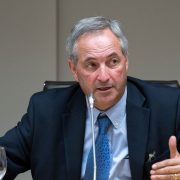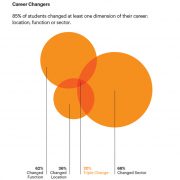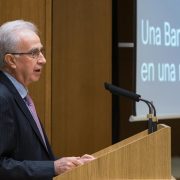The Economist’s Daniel Franklin shares forecasts for 2018
Madrid, February 16, 2018. – Cyber-attacks, backlash against technology giants and elections in the Americas and beyond; these are some of the events and trends expected to move the needle in global business this year, according to Daniel Franklin, editor of The Economist.
At a standing room-only event at the Madrid campus on Feb. 15, Franklin presented The Economist’s “The World in 2018,” the magazine’s annual issue of forecasts across global business, politics, technology, and culture. Prof. Juan José Toribio welcomed Franklin to the campus.
Smart business leaders are already braced for cyber-breaches. But Franklin said cyber-attackers could scale up this year. “Maybe in 2018 a new kind of attack will appear … related to an actual event rather than the theft of a trove of data,” he said. Hackers could compromise the physical movement or performance of objects via the Internet of Thing-enabled devices.
Data is already occupying business leaders’ minds this year in the form of the European Union’s tough new data protection law, the General Data Protection Regulation (GDPR). GDPR goes live in May and affects any organization, European or otherwise, which stores EU citizens’ data. “This is a very big deal,” Franklin said. “Data is the new oil and how you regulate it matters,” he added.
The Business of Politics
GDPR is part of the global backlash – or “techlash” – against perceived over-reach and tax avoidance by technology firms. The Economist expects the pendulum of power to swing back toward government in 2018, with states buckling down on swashbuckling tech titans.
Staying with politics, the two heavyweights of Latin America – Mexico and Brazil – will hold presidential polls in 2018. The Brazilian leadership battle is tough to call as the main protagonists are mired in legal actions. In Mexico, Franklin expects veteran firebrand Andrés Manuel López Obrador to ride the anti-Trump wave, but predicts PRI will win on the day.
But it’s mid-term elections in the U.S. in November that may provide the political drama of the year “because the Democrats have a chance to take the House,” Franklin stated. The Economist predicts the Republicans will lose the House, stymieing GOP-sponsored legislation and giving a shot in the arm to the investigation into Russia’s involvement in the 2016 presidential elections.
Back in Europe, the “known unknown” of Brexit is preoccupying business leaders: how can companies prepare for the UK’s EU exit in 2019 with so much in flux? But a framework must be hammered out by the end of 2018. “Negotiations over Brexit are about to get extremely fraught,” Franklin said.
“My guess is a ‘softer’ Brexit as this is the only way the government can get a majority,” he predicted. There is still a “small but real chance” that the Brexit train gets derailed, though. “I cannot stress how fragile the situation is. The potential for a mess and mini-panic is quite large,” Franklin said. But The Economist editor put the odds of a stalled Brexit at just 15%.
The Helicopter View
Looking at the macro-economic outlook, Franklin said “there are animal spirits of optimism in industry,” because for the first time since the financial crisis, the six continents are growing at roughly synchronized speed. “No one is holding the global economy back and no-one is racing ahead,” he said. This global growth could lead to “effervescence,” Franklin noted, “but let’s not spoil the party.”
Also for the first time in a while, China is no longer one of the fastest-growing economies in the world, although it’s trotting along at a very respectable 6.0% growth. India is the only big name in The Economist’s Top 10 for 2018, with 7.8% GBP growth predicted for this year. “China’s population is starting to shrink, while India has a more dynamic population outlook,” Franklin said.
The One That Got Away
Prof. Toribio congratulated Franklin on The Economist’s solid record on predictions. Reading the runes is a tricky business, though, and Franklin said the imminent fall of the Castro regime in Cuba is the one forecast that its editors have consistently gotten wrong. But with Raúl Castro on the cusp of retirement, 2018 might be the year it comes true.










